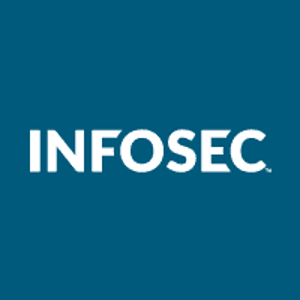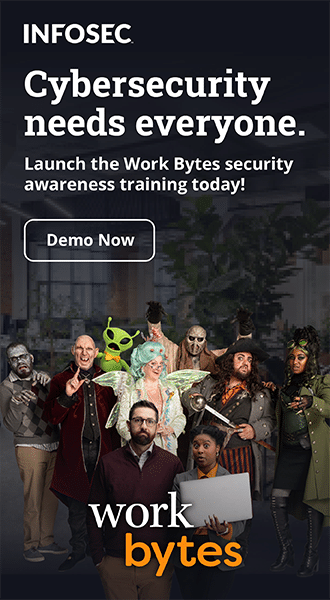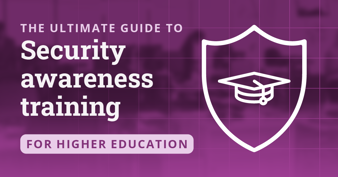Optimizing your corporate security awareness training: Strategies and techniques
In a digital-first world, security is no longer the sole responsibility of the IT department — it requires every individual in an organization, from C-suite to your associates. Fortunately, busy IT departments can focus on crucial responsibilities and leave corporate security awareness training to us. Infosec offers expert-designed cybersecurity training that empowers all your employees to recognize risks before they affect your business.
Learn what corporate security awareness is, potential cybersecurity threats your business may experience and how corporate security risk management strategies and techniques help educate every employee. Smart training helps your business stay compliant and inspires behaviors proven to keep your organization secure.
Phishing simulations & training
![]()
Understanding corporate security awareness training
Corporate security awareness training is a formal process for educating employees about computer-related security. The best training works from the premise that each employee is an important part of cybersecurity strategies. It goes beyond installing firewalls or encryption software and puts people at the center of the strategy.
The training aims to foster a security culture across your organization, instill the best practices and create lasting cyber secure habits. If done correctly, it ensures your employees correctly identify and respond to potential threats, making them one of your company's best cybersecurity defenses.
A well-informed workforce prevents security incidents by identifying and reporting suspicious activities to support your IT department. Industries such as healthcare, finance or businesses dealing with sensitive personal information often require organizations to demonstrate and verify educational measures that teach about potential cyber threats. Cybersecurity training helps ensure that your business is in regulatory compliance.
Let's look at some crucial aspects of corporate security awareness training:
Threat awareness
Understanding and being mindful of potential threats is the first step toward a secure organization. Common cyber threats include malware, phishing attacks and ransomware. Employees become beacons of defense for your organization by learning to recognize these threats.
Some of the most common cybersecurity threats that affect corporations:
-
Phishing attacks: Phishing involves communications, often pretending to be from legitimate sources, designed to trick people into giving away sensitive information or installing malware. Email is the main delivery method, and typically will use the name of a company contact to appear real.
-
Malware: Malware — malicious software — takes the forms of viruses, worms, trojan horses, spyware, adware and ransomware. The aim is to steal sensitive information or gain access to your network to disrupt or cause damage. Some of the worst malware can live on your company's internal systems without you ever being aware of it.
-
Spearphishing attacks: Spearphishing is a more targeted form of phishing that involves meticulously crafted messages. These convincingly appear to come from a known or trusted sender and are often harder to detect because they are highly personalized and detailed.
-
Ransomware: Ransomware is malware that encrypts an organization's data. The attackers demand ransom for the decryption key, often payable in crypto or some other difficult-to-track currency. Recent high-profile ransomware attacks have shown the serious impact this threat can have on businesses.
These are just a few examples. Cybersecurity threats continually evolve, with new technologies and tactics making them harder to recognize. Enrolling your team in security awareness training helps your business stay proactive and cyber-safe.
Policy understanding
It’s essential to have a clear, comprehensive set of security policies. This is the best way to give your employees a manageable road map and encourage them to participate in best practices. Detail how your organization protects its information assets and share the dos and don'ts with all employees. Corporate information security training should cover your policies in depth, allowing every employee to understand their role in maintaining security. Policies should include:
-
Procedures for reporting security incidents: Including who to contact, what information to provide and the steps that should be taken to minimize damage and prevent future incidents.
-
Policy accessibility: Your security policies need to be available to all employees. Companies can make their security policies accessible by email, posting them on an internal website or including them in employee onboarding materials. It is important to regularly review and update the security policy to ensure it remains relevant and effective.
-
Policy comprehension: Good training explains policies, why they exist and the potential pitfalls of not following them. Understanding the “why” can increase commitment to following policies to the letter.
Infosec provides comprehensive security awareness so all your employees will understand the importance of your organization's security policies.
See Infosec IQ in action
![]()
Safe practices
From creating strong passwords to recognizing suspicious emails, corporate security awareness training equips employees with the skills to navigate the digital world safely. Regularly updating these practices keeps your organization ahead of the ever-evolving cyber threat landscape.
Strategies for effective corporate security awareness training
While every organization's security needs are unique, there are several strategies the best training should include. They are:
-
Ongoing training: Cyber threats evolve constantly, so your training must too. Regular training material updates ensure your workforce stays informed about the latest threats.
-
Real-world scenarios: Using real-world examples can help employees understand the relevance of the training and the potential impact of cyber threats. At Infosec, we work with various industries and can tailor your corporate cybersecurity training to reflect the cybersecurity threats your employees will face daily.
-
Role-based training: A finance employee may receive training on secure financial transactions, while a human resources employee may receive training on protecting employee personal information. Each employee's role-specific training is tailored to their job responsibilities, ensuring they have the knowledge and skills to secure the company's information.
-
Scenario-based learning: Using real-world examples and scenarios makes training more engaging, accessible and relatable. The best corporate security awareness training programs tailor training modules to mimic daily incidents your employees may face.
Regular informative and engaging training gives your staff the tools to be ready when a real attack hits.
Techniques for corporate security awareness training
The methods used to deliver corporate security awareness training can greatly influence its effectiveness. Often, it's not what information is taught, but how that information is delivered that will best resonate with your employees. Infosec's security awareness for employees includes simulations such as:
- Engaging content: For training to be effective, it needs to be engaging, and we mean more than a slideshow with a few fun graphics. Interactive content, such as quizzes, games and educational videos, keeps employees engaged and improves retention.
-
Phishing simulations: This technique involves simulating phishing attacks to test employees' awareness and response at the point of attack — their inbox. It provides a real-world context for understanding the threat and practicing safe behaviors.
-
Program automation: Running a security awareness program shouldn't slow your business down. Look for the ability to automate aspects like learner management, training campaigns, and phishing simulations so you can easily keep your team up-to-date on the latest security best practices without spending hours managing the process yourself.
These are just a few security awareness techniques your corporation can use to achieve your cybersecurity business objectives.
See Infosec IQ in action
![]()
Hackers won't wait, nor should you
In an era when cybersecurity risks for businesses are at an all-time high, corporate security awareness training is indispensable for safeguarding your organization. Implementing strategic and technical measures in your training creates a security-conscious work environment, reduces the likelihood of cyber incidents and enhances your corporate cyber security posture.
Infosec offers a range of corporate security awareness training solutions tailored to your organization's specific needs. Equip your workforce with the skills and knowledge to tackle cyber threats head-on. Contact us today to learn more.








